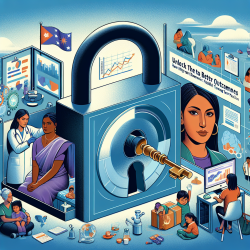Introduction
As the role of artificial intelligence (AI) continues to expand in various sectors, including education and therapy, understanding and implementing AI accountability regulations becomes crucial for practitioners. The research paper titled "Obligations to assess: Recent trends in AI accountability regulations" provides valuable insights into how these regulations are shaping the development and deployment of AI systems. This blog explores how practitioners, especially those in the online therapy sector, can enhance their skills by implementing these insights.
Understanding AI Accountability Regulations
The paper highlights the shift towards using assessments of social, economic, and ethical impacts as a governance model for automated decision systems. This trend is evident in both the United States and the European Union, where proposed legislation requires developers to assess the impacts of their systems on individuals, communities, and society. This approach goes beyond the technical assessments familiar to the industry, emphasizing the need for transparency and accountability.
Key Takeaways for Practitioners
- Documentation and Transparency: Practitioners should prioritize comprehensive documentation of AI systems, focusing on potential biases and discriminatory impacts. This transparency is crucial for compliance with new regulations and for building trust with stakeholders.
- Stakeholder Engagement: Engaging with a diverse range of stakeholders, including those from historically marginalized communities, is essential. This engagement helps identify potential harms and ensures that AI systems are developed with a broad perspective.
- Continuous Learning: Staying informed about the latest trends in AI accountability and participating in relevant training sessions can enhance a practitioner's ability to implement these regulations effectively.
Implementing AI Accountability in Online Therapy
For companies like TinyEYE, which provide online therapy services, integrating AI accountability practices can significantly enhance service delivery. By ensuring that AI systems used in therapy are free from biases and are transparent in their operations, practitioners can offer more equitable and effective services.
Here are some steps practitioners can take:
- Conduct Regular Audits: Regularly auditing AI systems to identify and mitigate biases can help maintain compliance with regulations and improve service quality.
- Develop Ethical Guidelines: Establishing clear ethical guidelines for AI use in therapy can guide practitioners in making informed decisions.
- Foster a Culture of Accountability: Encouraging a culture of accountability within the organization can lead to more responsible AI use and development.
Encouraging Further Research
While the paper provides a comprehensive overview of current trends in AI accountability, practitioners are encouraged to delve deeper into this topic. Engaging with ongoing research and participating in discussions can provide additional insights and help practitioners stay ahead of regulatory changes.
Conclusion
AI accountability regulations are reshaping how practitioners develop and deploy AI systems. By understanding and implementing these regulations, practitioners can enhance their skills, improve service delivery, and ensure compliance with legal standards. As AI continues to play a pivotal role in sectors like online therapy, staying informed and proactive is essential for success.
To read the original research paper, please follow this link: Obligations to assess: Recent trends in AI accountability regulations.










